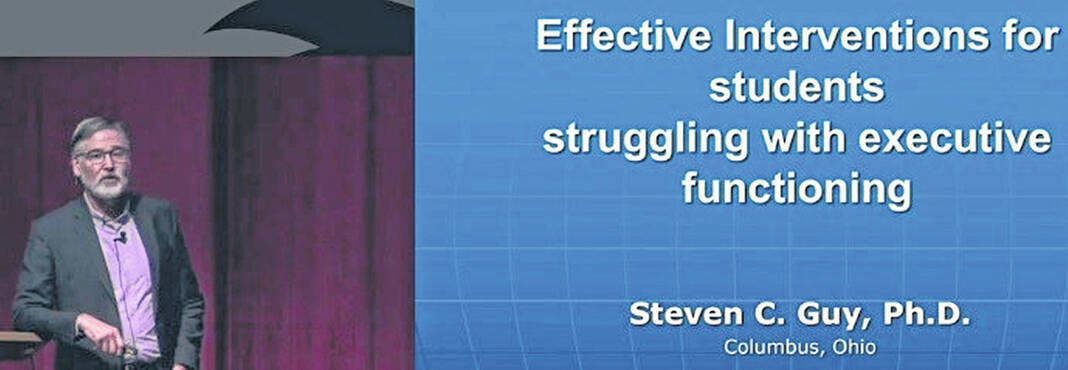
Courtesy | BWLSD
SUNBURY — Columbus pediatric neuropsychologist Dr. Steven Guy spoke recently about “effective interventions for students struggling with executive/regulatory functioning” at the Big Walnut Student Services Collaborative.
“It’s execution and regulation of attention,” Guy said of the term executive functioning. “These kids have higher potential than they’re demonstrating, but they’re not executing that level. They are inconsistent.”
Another way of putting executive functioning is “those interrelated skills necessary for purposeful, goal-directed activity” on an independent basis. “It is a lot of different things,” Guy said, such as “working memory,” “cognitive flexibility,” “emotional control,” along with behavioral, organizational and planning functions that are based in the frontal system and frontal lobe of the human brain, specifically the prefrontal cortex.
There can be problems with initiating and sustaining tasks and routines, organization, planning, and dealing with change.
He likened proper executive functioning to being the conductor of an orchestra — independent, reliable and goal directed. In the classroom, it equates to being “the single best predictor of school readiness” as well as “social, psychological and behavioral domains” in the real world, he said.
To some extent, we all have issues with executive functioning, Guy said, comparing life to a game of whack-a-mole or spinning several plates at once.
He added a fictional example of someone with executive functioning issues is the Peanuts character Pigpen, who had cleaned himself up for the school photo, but went back to being messy once the photo was taken. Guy said it can also take the form of the student who shores up their grades in one class, at the expense of the other courses. They are being told to try harder, when they should be working smarter not harder, he said.
Guy calls himself a learning doctor who tests young people when they come to his office.
“One of the best things I get to do as a psychologist is tell kids how smart they are,” Guy said. “There’s lots of different ways to be smart.”
Interventions were needed for behavioral control, cognitive control and emotional control, he said.
The general principles of executive functioning intervention consist of teaching goal directed problem-solving within everyday meaningful routines, having real-world relevance and application, using key people as models and coaches, Guy said. Supported study halls and continuing the Head Start program are other forms of intervention. Allowing them to access calculators, productivity apps, dictation software, seat placement and even egg timers (to avoid lengthy, monotonous tasks) can improve their efficiency, he added.
“Just helping a kid manage their things reduces stress,” Guy said. It’s important to keep things positive and to let the student know this is a correctable condition like any other learning disability. “We’re not changing the content … we’re just helping them (be more effective). … Teachers can make the biggest difference in the world in a child’s perspective about themselves.”
Another part is teaching how the brain works, as well as brain health through exercise, meditation/mindfulness, nutrition and sleep. “Medicine is never the only answer,” he said. “The medicine helps you pay attention and to be less impulsive and regulate your emotions.”
Other tools include the “Smart but Scattered” book series, the “Unstuck & On Target!” method and using a “Goal-Plan-Do-Review” worksheet. “You’re much more likely to achieve a goal if you write it down,” Guy said.
In response to an audience question, Guy recommended reading nightly to youngsters diagnosed with dyslexia to get them interested in reading.
Ross Linscott, director of student services for the Big Walnut Local School District, introduced Guy before his 95-minute talk and said a mixture of families and staff members attended the Feb. 22 event, which can be seen on YouTube.
The BW Student Services Collaborative is described as “a family and district support group for families of students with IEPs and 504 plans.”
IEP is an acronym for Individualized Education Program for special education students. The 504 plan refers to section 504 of the Rehabilitation Act of 1973, which prevents discrimination of and provides equal educational access to, those students with disabilities or medical conditions.
Assistant Editor Gary Budzak covers the eastern half of Delaware County and surrounding areas. He may be reached at [email protected].

